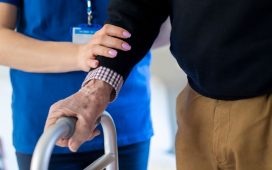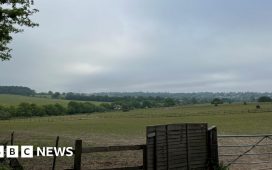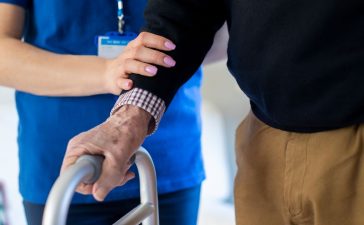Stride: I will continue to use X despite Elon Musk’s ‘absurd and deeply, deeply unhelpful’ comments
Conservative leadership candidate Mel Stride has described Elon Musk’s interventions into British politics as “absurd and deeply, deeply unhelpful”, but said that he would continue to use the platform.
Citing Musk spreading a completely fake Telegraph story that rioters were to be dispatched to the Falkland Islands and the billionaire’s claim that civil war was inevitable in the UK, Stride said:
Elon Musk, look, I think you know his comments about us sending people to the Falklands, which was untrue, his comments suggesting that we’re on the brink of a civil war in this country is absurd and deeply, deeply unhelpful.
I have concerns about X generally, in terms of the fairly permissive way, permissive approach, should I say, to those that are able to further all sorts of views, including conspiracy theories, on that platform.
And I do think that one of the takeaways from the very, very unfortunate incidents that have happened in recent days and weeks is that we do need to look afresh at social media in terms of policing content, in terms of consequence for those platform providers that allow some of these ideas to percolate, because they do have real world consequences, as we saw in our streets.
Asked if he himself was considering quitting the social media platform on Times Radio, Stride ruled it out:
Me personally? No, certainly not. At the moment, I know some fellow colleagues across the House actually have been debating that, and I think some of them might have actually done that. In my case, I will stay on the site.
But I do think we do need to have a long and long, careful, measured look at the way in which sites like X are feeding into issues like conspiracy theories, misinformation and violence on our streets.
The shadow work and pensions secretary said the situation might be improved by the Online Safety Act introduced by the last government although, he conceded “the actual teeth of that don’t bite until next year.”
Key events
Are you a teacher in England? If so, our community team would like to hear from you about whether you are worried about the spread of misinformation among pupils. Find out how to get in touch here …
Jess Phillips, the minister for safeguarding and violence against women and girls, described the level of violence, harassment and sexual offences against women on public transport as “unacceptable”.
She told PA Media:
In this day and age, no woman should have to plan her journeys by public transport based on where and when she will feel safe, and yet that is the daily experience for millions of women, whether they are commuting to and from work, or arranging an evening out with friends.
Getting on a night bus or near empty train to go home should not feel like taking your life into your hands.
Whether these figures reflect an increase in reporting, an increase in the volume of crime, or a combination of the two, one thing is clear, the level of violence, harassment and sexual offences that women and girls are facing when using the transport network is completely unacceptable, and cannot be allowed to go unchallenged.
Foreign secretary David Lammy has been meeting in London with his Saudi Arabian counterpart Faisal bin Farhan Al-Saud. In a message posted to social media, Lammy said “We’ll work together on shared defence, economic and security interests, including pressing for de-escalation in the region and a ceasefire and hostage release deal in Gaza.”
An environmental consultant has lost a high court challenge against the government’s approval of a new gas power station in north-east England, PA Media reports.
Andrew Boswell took legal action against ministers over the granting of development consent for the Net Zero Teesside Project by the former Tory government in February.
He alleged that the government had failed to “adequately” explain how the power plant, which is forecast to emit millions of tonnes of greenhouse gases, will help deliver the government’s net zero goal. The project was given the green light by former energy secretary Claire Coutinho.
In a written ruling on Wednesday, Mrs Justice Lieven dismissed his case, concluding that there was “no logical flaw in the reasoning” set out by ministers.
Labour leader in Scotland, Anas Sarwar, is already talking about the 2026 Holyrood election. He has posted a video this morning on what he described as “the next steps for change”, saying:
We’ve got rid of the Tories, and we’ve got straight to work, to deliver the change Scotland needs. But let’s be clear, our schools, our hospitals and our public services are still in crisis because of 17 years of SNP incompetence. In 2026, we have an opportunity to complete the next stage of change with Scottish Labour.
Just after Sarwar published his video, the Scottish government were promoting one change that has come about in the last few weeks – a decision to restrict winter fuel payments to pensioners by means-testing it.
In a statement, the SNP’s social justice secretary Shirley-Anne Somerville confirmed the Scottish government will replicate a decision taken by the UK government and applying to England and Wales, and that Scotland’s pension age winter heating payment will be limited.
She said “Despite all efforts to review our financial position we have been left with no choice but to follow the UK government and restrict payments to older people who receive relevant eligible benefits.”
The Scottish government says there is no change to eligibility for winter heating payments for those on low incomes or to child winter heating payments.
UK Government plans to end universal fuel payments for older people mean the Scottish Government budget will be cut by up to £160 million.
This cut has left Ministers no choice but to limit Pension Age Winter Heating Payment in Scotland.
Find out more: https://t.co/bm9KUp7ZOQ pic.twitter.com/lkNisZMgFG
— Scottish Government (@scotgov) August 14, 2024
Private rents have risen 8.6% in a year according to ONS estimates
A little more on those house price rises we reported on earlier. The average price for a home increased by 2.7% in the 12 months to June in the UK, but as mentioned, that is not evenly distributed.
PA Media reports that in Scotland, the average property cost £192,000, up 4.3% from a year ago, and in Northern Ireland it was £185,000 between April and June, 6.4% higher than the same period a year ago.
Private rents across the country jumped 8.6% in the year to July, averaging £1,319 monthly, according to the ONS’s estimates.
PA Media spoke to Sarah Coles, head of personal finance for Hargreaves Lansdown, who said rent rises remain “eye-watering” and that “Landlords continue to sell up in the face of higher mortgage costs”. She added “growing tenant numbers make it harder to get hold of a property, even if you’re prepared to pay sky-high prices. It’s difficult to see how things will ever get any better.”
Nathan Emerson, chief executive of Propertymark, told PA: “The rental market continues to feel the harsh reality of ongoing pressures on housing demand, which are outstripping current supply. This has a real-world effect on rental prices for consumers and that consequence is prices tend to be pushed further upwards.”
Transport secretary: figures on violence against women and girls on trains ‘appalling’
Labour’s transport secretary Louise Haigh has described as “appalling” a set of figures which show that violence against women and girls on British railways has risen by more than 50% over two years, and said reducing it is “an absolute priority”.
In a post to social media, the MP for Sheffield Heeley said:
These figures are appalling. Everyone should be safe on public transport. That’s why under this government, our publicly owned railways will be relentlessly held to account on safety and standards, and completely focused on the passenger.
I’ve already met with the British Transport Police to discuss how we work together to end the scourge of violence against women and girls on our public transport. This is an absolute priority for me.
These figures are appalling.
Everyone should be safe on public transport.
That’s why under this Government, our publicly owned railways will be relentlessly held to account on safety and standards, and completely focused on the passenger. https://t.co/kKFN0SBCgD
— Louise Haigh (@LouHaigh) August 14, 2024
As my colleague Geneva Abdul wrote earlier:
The number of crimes against women and girls rose from 7,561 in 2021 to 11,357 in 2023, and the number of sexual offences rose 10% from 2,235 to 2,475, according to a survey commissioned by British Transport Police. The survey, first reported in the Times, also found the number of sexual harassment reports doubled to 1,908, over the two-year period.
A British Transport Police survey released last year revealed more than a third of all women travelling by rail were likely to be assaulted while commuting – predominately during rush hour time, according to figures – and showed 51% of female victims reported that other rail passengers intervened to try to help.
James Cleverly has posted that he is campaigning for the Tory leadership in the Isle of Wight today with local MP Joe Robertson.
Robert Jenrick, one of the six people vying to replace Rishi Sunak as leader of the opposition, has meanwhile posted a video clip in which he claims to be summing up 40 days of Keir Starmer’s Labour government in 40 seconds.
Among other things he criticises the administration for are scrapping Sunak’s Rwanda deportation scheme and releasing “1,000s of dangerous criminals”. The latter is apparently a reference to the Labour decision from next month to release non-violent offenders after they have served 40% of their sentence, continuing an early release scheme introduced by the previous Conservative government that Jenrick was part of before his resignation in December.
Jenrick also claims Labour have invented “a black hole in the public finances … to justify tax rises and broken promises” and in what sounds very much like a Trumpist US talking point he says they have put into place “a radical left wing academic reviewing the curriculum for our kids at school”.
By popular demand, here is video of Liz Truss being ambushed by a lettuce.
Political corespondent Aletha Adu has a write-up here …

Richard Partington
Our economics correspondent Richard Partington offers this analysis of why the Bank of England could still cut interest rates again despite the rise in inflation:
The latest figures revealed a much sharper than forecast decline in service sector inflation, down from 5.7% in June to 5.2% in July, where prices for restaurants and hotels plunged on the month. Core inflation – which excludes volatile items including energy, food, alcohol and tobacco – also fell.
Both figures are closely watched by the Bank. Softer falls in previous months gave policymakers enough comfort earlier this month to cut interest rates for the first time since the coronavirus pandemic. Further signs of cooling could therefore open the door to another reduction in borrowing costs, with investors betting on a cut from 5% to 4.75% from as early as September.
Andrew Bailey, the Bank’s governor, may, however, want to wait for more data, such as the gross domestic product and retail sales figures released later this week. Jobs market figures on Tuesday – which showed falling unemployment and robust wage growth – will have given the Bank a headache, as they suggest there may still be lingering domestic pressures. Threadneedle Street also forecasts headline inflation will reach 2.75% by the end of the year before falling to 1.7% within two years’ time.
Despite easing inflationary pressures, households are still also feeling the pinch. Falling inflation does not mean prices are coming down, only that they are rising at a slower pace.
Read more here: Bank of England could still cut interest rates again despite rise in inflation
Jack Simpson
A £450m plan to expand an AstraZeneca vaccine-manufacturing site in Merseyside has suffered a blow after it emerged the government plans to cut some of the funding for the scheme.
It is understood that the chancellor, Rachel Reeves, is considering reducing the state aid earmarked for the scheme by more than £20m after her predecessor, Jeremy Hunt, had promised the pharmaceutical company £65m.
The cut to funding is part of a wide-reaching review of all investment decisions taken by the previous administration, the Financial Times reported.
Read more here: Reeves ‘planning to cut state aid’ for AstraZeneca project in Merseyside
Tom Tugendhat was very prominent in the blog yesterday, as he was one of very few politicians to appear in public so far this week during the summer recess period. He was making a wide-ranging set-piece speech as part of his leadership campaign for the Conservative party, which include an attack on Keir Starmer’s handling of recent far-right led violent disorder, and strong criticism of Nigel Farage for “amplifying false information” by spreading a theory first suggested by influencers like Andrew Tate, and then failing to wholly condemn the riots. My colleague Rowena Mason has a write-up of that here.
Tugendhat this morning is campaigning with a poster suggesting he is the person that the public feel will most do a good job as opposition leader to replace Rishi Sunak.
There is a little bit of creative accountancy in the way Tugendhat has presented the figures there, because he has gone with the net approval rather than overall figures. In fact the Ipsos survey he is referencing found that 18% of people think that James Cleverly is the best option, with 17% of people saying Tugendhat or Priti Patel would do the better job.
39% of people said they had never heard of Tugendhat at all, a lower proportion than the 50% of people who said they had never heard of Mel Stride, which seems scant reward for the amount of hours the seemingly ever-present Stride put into media interviews during the election campaign.
Worth noting too that in the survey, Stewart Lewis and Sarah Lewis polled 9% and 6% respectively, and Stewart Lewis has a net positive rating of +2%, despite neither of them existing.
The government has just published the UK house price index for June 2024. It states that on average, house prices have risen 0.5% since May 2024 and there has been an annual price rise of 2.7%, which makes the average property in the UK valued at £288,000.
There is, as ever, considerable regional and national differences hidden within the figures. In England house prices have risen by 0.6% since May 2024, with Yorkshire and the Humber experiencing the highest monthly and annual rises, the south-west seeing a 1% monthly fall in prices, and London showing the slowest annual growth, at 0.6%.
Wales has seen a monthly rise of 0.3% and an annual rise of 1.8%, with the average property valued at £216,000.
The figures for Scotland and Northern Ireland are collected separately and not broken down in today’s government bulletin.
The latest ONS data on private rentals is from January of this year, and showed rents rising by 6.2% in the 12 months to January 2024.

Geneva Abdul
Violence against women and girls on British railways has risen by more than 50% over two years, according to official figures.
The number of crimes against women and girls rose from 7,561 in 2021 to 11,357 in 2023, and the number of sexual offences rose 10% from 2,235 to 2,475, according to a survey commissioned by British Transport Police. The survey, first reported in the Times, also found the number of sexual harassment reports doubled to 1,908, over the two-year period.
“I think it’s just a reminder of the fact that we’ve got this issue of violence against women and girls (VAWG) that isn’t going away and if anything is getting worse,” said Anna Birley, a co-founder of Reclaim These Streets, which organised the London vigil for Sarah Everard, 33, who was killed by police officer Wayne Couzens in 2021.
“I want to be clear I think there is also an increase in VAWG. I don’t think it’s simply a case of increased reporting,” Birley told BBC Radio 4’s Today programme.
Read more here: Violence against women on UK trains rises by 50% in two years
A commission of energy experts has been set up to review the impact of the gas crisis and ensure the UK is better prepared in future, PA Media reports.
The Energy Crisis Commission will bring together representatives from Energy UK, the Confederation of British Industry (CBI), Citizens Advice and National Energy Action.
David Laws, Energy UK chairman and the former Liberal Democrat MP for Yeovil, will chair the commission. Laws said: “The energy crisis has been hard on households and businesses alike. It is important that we reflect on what has happened and steps that the country could take to mitigate the impacts of any future crises to ensure we are more resilient.”
The CBI is attempting to rebuild its public profile after what its president Rupert Soames described as the “near-death experience” of a series of revelations about sexual misconduct at the lobbying group.

Aletha Adu
A former Conservative deputy prime minister who lost her seat at the last general election applied for a job in Labour’s Treasury department. Thérèse Coffey also had a stint as the health secretary and was one of Liz Truss’s fiercest allies when she was prime minister.
Coffey, who is one of more than 200 former Conservative MPs forging a new career after Labour’s landslide election victory cost them their seats, applied to become the UK director at the European Bank for Reconstruction and Development (EBRD), the Telegraph reported.
The role Coffey applied for was advertised on LinkedIn by the Treasury in July, with the posting saying that the position would include “representing the UK and promoting the UK’s interests at the EBRD board in a credible and effective manner”.
However, Coffey was unsuccessful. She told the Telegraph: “It was an interesting role. I thought I would apply given my experience in government on international work. I have dealt with these sorts of banks before.”
Read more here: Thérèse Coffey was turned down for Labour Treasury job
Lib Dems call for special appeals process for A-level student disrupted by crumbling concrete
Overnight the Liberal Democrats have called for A-level students in England and Wales who had their education disrupted by crumbling concrete in schools to have the ability to appeal against their grades.
In a statement calling for a “special appeals process”, the party said “schools facing issues with crumbling concrete have had to deal with sudden closures, relocations and significant disruptions to learning, including children being taught in portacabins” but pointed out that pupils “are set not to receive any moderation in their exam marking to reflect these challenges”.
Liberal Democrat education spokesperson Munira Wilson said:
The previous Conservative government abandoned children and parents leaving a legacy of crumbling classrooms. The new government must now ensure pupils and parents impacted by these years of chaos are given the support they need.
That is why the Liberal Democrats are calling for a special appeals process for A-level students affected by crumbling concrete, to ensure they get the grades they deserve.











